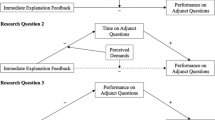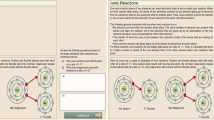Abstract
Both active questions i.e. questions asked by subjects, and provided (or passive) questions i.e. offered to subjects as problems for solution, had been found to facilitate learning and retention of prose material when subjects were faced with a task of sufficient difficulty to challenge their competence. With difficult prose, boys and low ability subjects had gained most from active questions. These effects were more pronounced in the long term. In this study, the effects of relevant active questions i.e. questions which subjects can put alongside answers, are investigated and compared with those of active and provided questions, over a series of six presentations for both the short and the long term (i.e. after ten months). In the short term, although active questions give greater help than provided questions on the first presentation, and relevant active questions give the greatest improvement between the first and second presentations, provided questions are the most helpful overall. In the long term, however, both the active questions treatments prove to be as effective as provided questions. For low ability boys, the difference between treatments is negligble even in the short term; under the relevant active questions treatment the number of questions asked is greater; and the decline in inspection time over presentations is negligible.
Similar content being viewed by others
References
Ausubel, D. P. (1968). Educational Psychology: A Cognitive View. New York: Holt, Rinehart and Winston.
Berlyne, D. E., and Frommer, F. D. (1966). “Some determinants of the incidence and content of children's questions,” Child Dev. 37 (1): 177–89.
Broadbent, D. E. (1971). Decision and Stress. New York: Academic Press.
Frase, L. T. (1968a). “Some data concerning the mathemagenic hypothesis,” Am. Educ. Res. J. 5 (2): 181–9.
Frase, L. T. (1968b). “Effect of question location, pacing and mode upon retention of prose material,” J. Educ. Psychol. 59: 244–9.
Frase, L. T., and Schwartz, B. J. (1975). “Effect of question production and answering on prose recall,” J. Educ. Psychol. 67: 628–635.
Miller, G. A. (1956). “The magical number seven plus or minus two: Some limits in our ability for processing information,” Psychol. Rev. 63: 81–97.
Prosser, G. V. (1974a) “The role of active questions in learning and retention of prose material,” Instr. Sci. 2: 451–476.
Prosser, G. V. (1974b) “Questions as an aid to learning,” pp. 347–412 in W. P. Robinson (ed.), Education, Curiosity and Questioning. University of Southampton.
Rickards, J. P., and Denner, P. R. (1978) “Inserted questions as aids to reading text,” Instr. Sci. 7: 313–346.
Rothkopf, E. Z. (1965) “Some theoretical and experimental approaches to problems in written instruction,” pp. 193–221 in J. D. Krumboltz (ed.), Learning and the Educational Process. Chicago: Rand McNally.
Rothkopf, E. Z. (1966) “Learning from written instructive materials: an exploration of the control of inspection behavior by test-like events,” Am. Educ. Res. J. 3, 241–9.
Rothkopf, E. Z. (1968). “Textual constraint as function of repeated inspection,” J. Educ. Psychol. 59 (1): 20–25.
Rothkopf, E. Z. (1976). Writing to Teach and Reading to Learn: a Perspective on the Psychology of Written Instruction,” pp. 91–129 in N. L. Gage (ed.), The Psychology of Teaching Methods. Chicago: The National Society for the Study of Education.
Roughead, W. G., and Scandura, J. M. (1968). “‘What is learned’ in mathematical discovery,” J. Educ. Psychol. 59: 283–89.
Smith, K. U., and Smith, M. F. (1966). Cybernetic Principles of Learning and Educational Design. New York: Holt, Rinehart and Winston.
Tulving, E., and Osler, S. (1967). “Transfer effects in whole part free-recall learning,” Can. J. Psychol. 21: 253–62.
Waugh, N. C., and Norman, D. A. (1965). “Primary memory,” Psychol. Rev. 72: 89–104.
White, R. W. (1959). “Motivation reconsidered: the concept of competence,” Psychol. Rev. 66: 297–333.
Wood, G. (1969). “Higher order memory units and free recall learning,” J. Exp. Psychol. 80: 286–88.
Author information
Authors and Affiliations
Additional information
This study formed part of a Schools' Council Research project (Director: Dr. W. P. Robinson) in the Department of Psychology, University of Southampton.
Rights and permissions
About this article
Cite this article
Prosser, G.V. The role of relevant active questions in learning based upon successive presentations. Instr Sci 7, 359–383 (1978). https://doi.org/10.1007/BF00121640
Issue Date:
DOI: https://doi.org/10.1007/BF00121640




